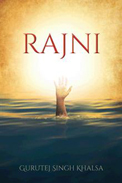
 |
The author imagined interviewing God about a story, perhaps a fable, he once heard, and it cleverly shows. In this historical novel, the author seamlessly combines the first person viewpoint of God's answers and thoughts, with his supporting characters' perspectives to convey the evolution of Rajni and her purpose. Set in India during the 15th and 16th centuries, Rajni is the youngest of seven daughters, born into wealth and privilege. She rises above her siblings with her ability to ask why and her sense of spirituality. Her perceived rebellion against her hard-hearted father leads to a punishment so severe, her subsequent journey affects the entire family and the rest of the era.
While this premise deftly grasps emotions and concern for humanity, it is the injection of humor about the personalities of God and his council members—deities, gurus and even demons—that most provokes reflection about mankind. The universe created in this narrative breathes with authenticity. You do not have to possess an interest in religion, meditation, or India to appreciate the story.
The glossary included at the beginning of the book may initially intrigue, but then appears unnecessary because the author does a good job of explaining foreign words and sacred jargon. While the word "cacophonous" is often used, the author employs simple descriptions and short chapters to make this book easy and quick to read, even at more than 320 pages. Most readers can predict the ending, and yet nothing else seems appropriate. This work of fiction is not what one might expect from a yogi, offering a jolt of satisfaction and gratitude.
RECOMMENDED by the US Review